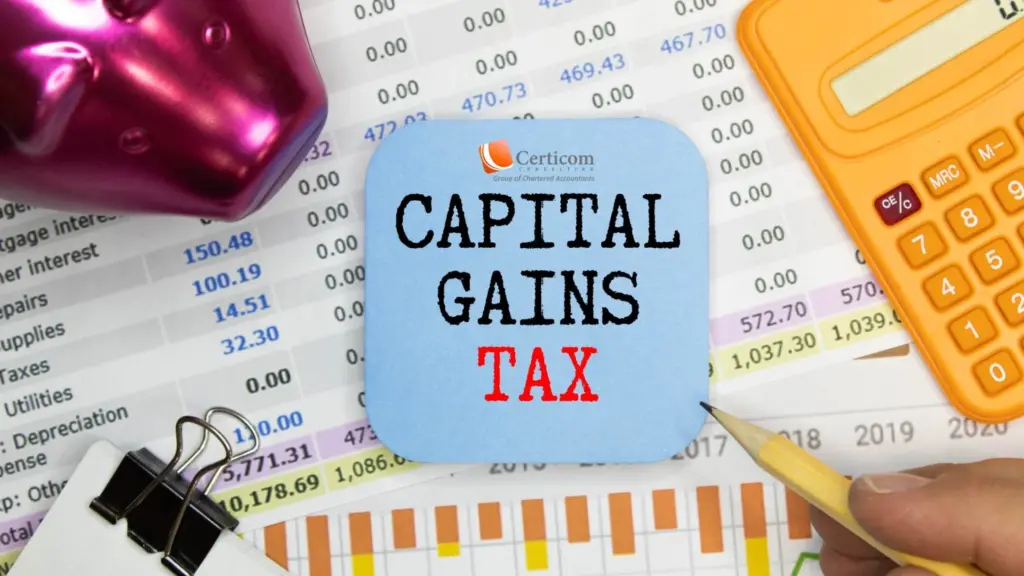A COMPREHENSIVE GUIDE TO SAVING CAPITAL GAINS TAX IN INDIA

Capital gains tax is an essential aspect of taxation in India, applicable when you sell certain assets and make a profit. However, there are several legitimate strategies you can employ to save on capital gains tax. In this blog, we’ll explore various scenarios and provide practical examples to help you understand how to minimize your tax liability.
Long-term Capital Gains (LTCG)
Scenario: Selling Stocks after Holding for More Than One Year
Example: Rahul purchased 500 shares of XYZ Ltd. in January 2019 at Rs. 100 per share. In February 2021, he sold these shares at Rs. 200 per share, resulting in a gain of Rs. 50,000.
a. Utilizing Section 54EC: Rahul can invest the capital gains (up to Rs. 50 lakhs) in specified bonds issued by NHAI or REC within six months to save tax on LTCG. This exemption is available only once in three years.
b. Opting for Section 54F: If Rahul invests the entire sale proceeds (not just capital gains) in a residential property within two years or constructs a property within three years, he can claim exemption under Section 54F.

2. Short-term Capital Gains (STCG):
Scenario: Selling Property within Three Years of Purchase
Example: Meera bought a residential property in April 2020 for Rs. 50 lakhs. In September 2021, she sold it for Rs. 65 lakhs, resulting in a gain of Rs. 15 lakhs.
a. Offsetting with STCG Losses: If Meera has incurred short-term capital losses (STCL) in other assets during the financial year, she can offset these against her STCG. This will reduce her taxable income and the resultant tax liability.
b. Reinvesting in a Residential Property: Meera can reinvest the entire capital gains within two years or construct a residential property within three years to avail of the exemption under Section 54.
3. Capital Gains from Mutual Funds:
Scenario: Redeeming Mutual Fund Investments
Example: Aman invested in an equity mutual fund scheme in January 2018. In May 2021, he decided to redeem his investment, resulting in a long-term capital gain of Rs. 2 lakhs.
a. Opting for Section 54EC Bonds: Aman can invest the capital gains (up to Rs. 50 lakhs) within six months in specified bonds to save on LTCG tax.
b. Utilizing Section 54F: Alternatively, Aman can invest the entire sale proceeds (not just capital gains) in a residential property within two years or construct a property within three years to claim exemption under Section 54F.
4. Capital Gains from Selling Gold:
Scenario: Selling Gold Jewellery or Bullion
Example: Sneha inherited gold jewellery worth Rs. 10 lakhs from her grandmother. In October 2021, she sold it and realized a long-term capital gain of Rs. 2 lakhs.
a. Opting for Section 54F: Sneha can invest the entire sale proceeds in a residential property within two years or construct a property within three years to claim exemption under Section 54F.

b. Utilizing Section 54EC Bonds: Another option for Sneha is to invest the capital gains (up to Rs. 50 lakhs) in specified bonds within six months to save tax on LTCG.
Read More: Why MNC employees with Esops are on taxman’s radar
Saving on capital gains tax in India requires careful planning and understanding of the relevant tax provisions. By exploring various scenarios and examples, we have outlined strategies such as utilizing exemptions under Sections 54, 54EC, and 54F, offsetting losses, and reinvesting in specified assets. However, it is crucial to consult a qualified tax professional or financial advisor to ensure compliance and make informed decisions based on your specific circumstances. With the right knowledge and appropriate strategies, you can effectively minimize your capital gains tax and maximize your after-tax returns.
Related Post
A Beginner’s Guide to E-Filing Income Tax Return for FY 2024-25
Faking Tax Deductions? You Could Be Penalised Up To 200% Under Income Tax Rules
Book A One To One Consultation Now For FREE
How can we help? *




